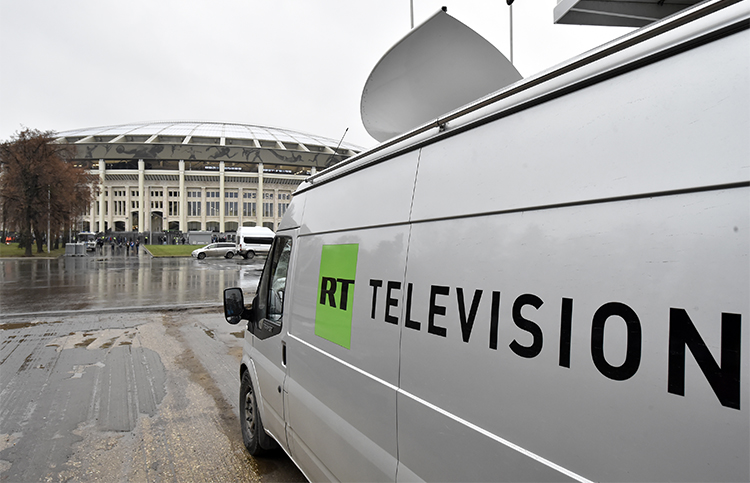New York, November 13, 2017–The Russian government-funded international news network RT, formerly Russia Today, said that it complied today with a U.S. Department of Justice order for it to register as a foreign agent. Ordering foreign outlets to register could set a troubling precedent, the Committee to Protect Journalists said.
RT said in a statement on its website on November 9 that it intended to challenge the U.S. Department of Justice’s order in court. The public affairs office of the Justice Department told CPJ via email that the department would decline to comment.
“Compelling RT to register under FARA is a bad idea. This is a shift in how the law has been applied in recent decades, so we have little information about how its reporting requirements might affect individual journalists,” said CPJ North America Program Coordinator Alexandra Ellerbeck. “We’re uncomfortable with governments deciding what constitutes journalism or propaganda.”
FARA was passed in 1938 to combat Nazi propaganda, but amendments added in 1966 shifted its focus primarily to political activities, such as lobbying, according to the Justice Department website.
RT previously reported that it received a letter in September from the Justice Department asking it to register under FARA. RT has not made the letter public. The head of RT, Margarita Simonyan, told the station that if the U.S. division refused to register it could face arrests or seizure of assets.
According to records on the Justice Department’s website, three media companies are currently registered under FARA: the American arm of the South Korean state-funded Korean Broadcasting System, KBS America, Inc., the Chinese state-funded China Daily, and the Japanese Radio and TV’s NHK Cosmomedia.
Entities registered under FARA are supposed to include a public disclaimer on any information that they send out and must also file a version with the Justice Department within 48 hours of transmission. This could technically include individual social media posts, text messages, and broadcasts. A report by the Justice Department’s Office of the Inspector General acknowledged that the rule could pose an “unrealistic burden” for entities that post regularly on social media. Individuals registered as agents of foreign principals also need to disclose any contact they have had with government officials or the U.S. media.
Criminal prosecutions under FARA are rare. Between 1966 and 2015, the Justice Department brought only seven criminal cases, the inspector general’s report said.
The focus on RT comes at a time of intense scrutiny of Russian efforts to influence last November’s presidential elections. Facebook, Google, and Twitter have all been called before the Senate Judiciary Committee in recent weeks. In January, the Office of the Director of National Intelligence released a report alleging that RT and the Russian state-funded outlet Sputnik played a role in a Kremlin-directed information campaign. RT issued a statement denying the allegation, and a Sputnik report described the claim as “groundless.”
RT and Sputnik cover news from a pro-Russia, often anti-West, editorial stance.
The Russian government has reacted by threatening retaliatory measures. Its lawmakers announced on November 10 that they were amending the country’s foreign agent law to include media organizations, according to the English-language daily The Moscow Times.
“It’s outrageous that the Russian government, which has attacked, undermined, and stifled independent media, and failed to properly investigate the murders of leading independent journalists in the country, is now threatening measures to curtail the work of international media organizations,” said CPJ Europe and Central Asia Program Coordinator Nina Ognianova said. “While we believe the U.S. actions on FARA are ill advised, we urge Russia not to use it as a pretext to justify punitive action.”
Russia is not the only country that has proposed or used foreign agent laws to register civil society organizations or media. According to the International Center for Not-For-Profit Law, Hungary, Kyrgyzstan, Ukraine, and Israel have debated or passed similar laws.
